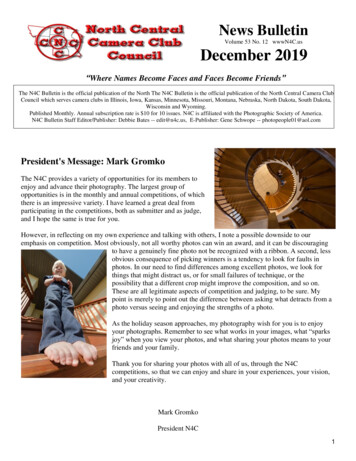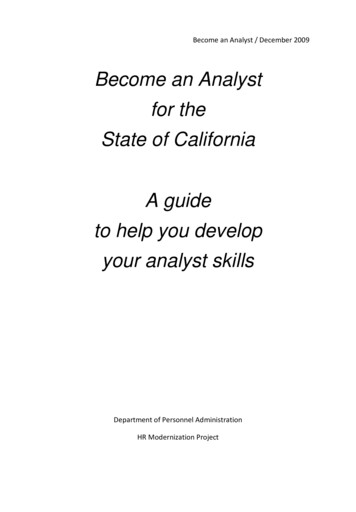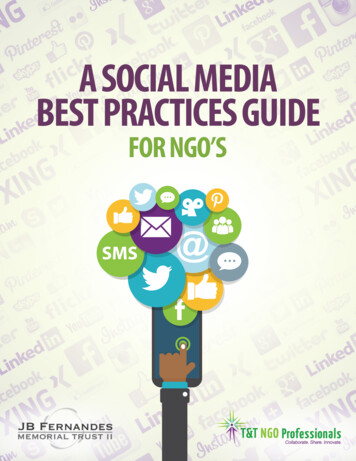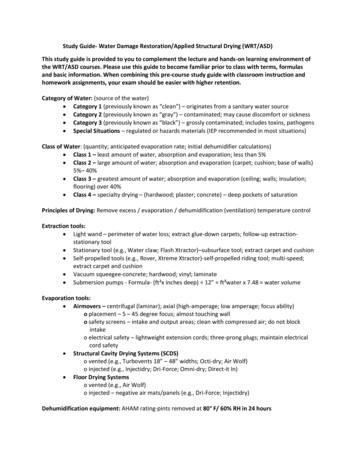
Transcription
Get paid to help people achieve success!FabJob Guide toBecome aLife CoachBrenna Pearce and Allan M. HellerVisit www.FabJob.com
FabJob Guide to Become a Life CoachContentsAbout the Authors.10Acknowledgements.111. Introduction.121.1 What is Coaching?.121.2 The Growth of Coaching.141.3 Who Becomes a Life Coach? .161.4 Are Coaches Consultants?.181.5 Coaching is Not Therapy.181.6 Inside This Guide.202. Coaching Specializations.222.1 Business Coaching.242.2 Carbon Coaching.252.2.1 A Client’s Carbon Footprint.252.2.2 Ways to Reduce Carbon Impact.272.3 Career Coaching.292.3.1 Exploring Career Options.292.3.2 Informational Interviews.312.3.3 Resumes and Cover Letters.322.3.4 Interviews.332.3.5 Thank-You Notes.342.4 Corporate Coaching.352.4.1 Goals of Corporate Coaching.362.4.2 Steps in Presenting a Training Program.372.4.3 Considerations in Corporate Coaching.392.5 Executive Coaching.402.5.1 Why Executive Coaches Are Hired.412 fabjob.com Copyright 2021 FabJob Inc.
FabJob Guide to Become a Life Coach2.5.2 Coaching Executives.422.5.3 Considerations in Executive Coaching.442.6 Relationship Coaching.442.6.1 Working with Singles.452.6.2 Working with Couples.462.6.3 Divorce.482.6.4 Other Relationship Areas.492.7 Retirement Coaching.502.7.1 Services Provided by Retirement Coaches.502.7.2 Retirement Planning.512.7.3 Pre-Retirement Assessment.522.7.4 Post-Retirement Coaching.552.8 Spiritual Coaching.562.8.1 Forms of Spirituality.572.8.2 Christian Coaching.582.8.3 Non-Traditional Spirituality.602.8.4 Helping People Focus.612.8.5 Workplace Spirituality.622.9 Time Management Coaching.632.9.1 Find Out How Time is Spent.642.9.2 Time-Saving Tips.662.9.3 ABC To-Do Lists.682.9.4 Personal Organizing Products.692.9.5 Celebrating Success.702.10 Weight/Body Image Coaching.712.10.1 Understanding Why People Overeat.722.10.2 The Importance of Exercise.742.10.3 Set Point Theory.742.10.4 Motivating Clients.76Copyright 2021 FabJob Inc. fabjob.com 3
FabJob Guide to Become a Life Coach2.10.5 Clients with Inappropriate Body Image Beliefs.782.11 Work/Life Balance Coaching.792.11.1 Coaching Individuals.792.11.2 Working with Companies.842.12 Other Specializations.863. Providing Coaching Services.893.1 How to Coach Individuals.893.1.1 Initial Consultation and Intake Session.903.1.2 Conducting a Coaching Session.993.1.3 Helping Clients Set Goals.1073.1.4 Helping Clients Achieve Success.1163.1.5 A Sample Coaching Session.1203.1.6 Laser Coaching.1233.2 Coaching Groups . .1263.2.1 Presenting a Group Coaching Session.1273.2.2 Group Coaching Considerations.1313.3 Ways to Deliver Coaching Services.1323.3.1 In-Person Coaching.1333.3.2 Telephone and Internet Coaching.1343.3.3 E-Coaching (Cyber Coaching).1353.3.4 Teleclasses and Webinars.1373.3.5 Workshops and Retreats.1423.4 Coaching Tools.1503.4.1 Sample Exercises for Individuals.1503.4.2 Instruments for Individuals.1553.4.3 Exercises and Instruments for Groups.1573.5 Evaluating the Coaching.1593.5.1 Evaluating Individual Progress.1594 fabjob.com Copyright 2021 FabJob Inc.
FabJob Guide to Become a Life Coach3.5.2 Evaluating Group Programs.1624. Ways to Learn Life Coaching.1654.1 Learning From Other Coaches.1664.1.1 Coaching Certification .1674.1.2 Attending Coaching Events.1694.1.3 Information Interviews.1704.1.4 Finding a Mentor.1734.1.5 Join An Association.1774.2 Get Coaching Experience.1794.2.1 Be a Coaching Client.1794.2.2 Coach Friends and Family.1804.2.3 Volunteer with Non-Profit Organizations.1814.3 Other Learning Resources.1824.3.1 Newsletters and Blogs .1824.3.2 Books.1834.4 Getting Hired as a Coach.1864.4.1 Your Resume.1874.4.2 Cover Letters.1955. Starting Your Own Business.2015.1 Starting Full-Time or Part-Time.2015.2 Creating a Business Plan.2035.3 Legal Matters.2125.3.1 Choosing a Business Legal Structure . .2125.3.2 Choosing a Business Name .2175.3.3 Licensing, Tax and Insurance.2205.4 Setting Up Your Business.2265.4.1 Choosing Your Office Location.2265.4.2 Start-Up and Operating Expenses.230Copyright 2021 FabJob Inc. fabjob.com 5
FabJob Guide to Become a Life Coach5.4.3 Office Equipment and Supplies . .2415.5 Keeping Track of Your Finances.2445.6 Setting Your Fees.2495.6.1 Calculating an Hourly Rate.2515.6.2 Fees for Individuals.2545.6.3 Group Coaching Fees.2595.6.4 Fees for Corporate Clients.2635.7 Getting Paid.2675.7.1 Client Contracts.2785.8 Working with Other Coaches and Support Staff.2856. Marketing Your Business.2936.1 Choose Your Target Market.2946.2 Marketing Tools.2976.2.1 Your Brand and Logo.2976.2.2 Printed Materials.2996.2.3 Your Website.3076.2.4 Social Media .3166.3 Marketing Techniques.3226.3.1 Online Marketing.3236.3.2 Networking .3266.3.3 Speaking and Events.3306.3.4 Paid Advertising.3366.3.5 Free Media Publicity.3436.4 Produce and Publish Your Own Products.3486.4.1 Book Publishing.3486.4.2 Audio Recordings.3516.4.3 Video Recordings.3536.4.4 Getting Help to Film and Edit Your Video.3556 fabjob.com Copyright 2021 FabJob Inc.
FabJob Guide to Become a Life Coach6.5 Marketing to Corporate Clients.3566.5.1 Proposals.3576.5.2 Meeting with Corporate Clients.3627. Succeeding as a Life Coach.3677.1 Ensuring Client Satisfaction.3677.2 Advice from the Experts.369You can find the most recently updated information for this careerin the Life Coach Certificate Course offered by InternationalAssociation of Professions Career College (also known as IAP CareerCollege) at iapcollege.com. Visit Life Coach Certificate Course tolearn more.Copyright 2021 FabJob Inc. fabjob.com 7
FabJob Guide to Become a Life Coach1. Introduction1.1 What is Coaching?Welcome to the FabJob Guide to Become a Life Coach and congratulationson choosing an exciting career that helps so many people to succeed intheir lives. You’ve taken the first steps to your own personal success bypurchasing this guide.We all know people who help others achieve their goals, who inspirefriends and family to persevere in the face of adversity, and refuse toallow them to wallow in the seeming security of a mediocre job orlife. They inspire others to greatness by gentle persuasion, constantencouragement, or a kind of in-your-face inducement. Perhaps you knowsomeone like that. Or perhaps you are someone like that, which is whyyou are reading this guide.It’s a myth that the reason so many people never accomplish theirgoals is because they don’t really want them, or don’t want them badlyenough. Life coaches understand that. People use life coaches for thesame reason that they use sports coaches or personal trainers: theywant someone to work with them, to encourage them, to push them. It’s8 fabjob.com Copyright 2021 FabJob Inc.
FabJob Guide to Become a Life Coacheasy to find excuses for not exercising when you don’t have someoneto push you; not as easy when your personal trainer shows up at yourdoor three times a week wearing a jogging suit.As a coach, your job is to provide objective, unbiased feedback toclients. Yours is not to judge or determine what clients should do orwhat they need, but to act as a facilitator so that they can figure it outfor themselves. Well-meaning though they may be, friends and familymembers may think that they know what is best for someone, and theirideas often conflict with what the individual thinks is best for himselfor herself. Life coaches free their clients from expectations imposed onthem by others.Life coaches can help people who are trying to do too much, and guidethem towards what they would really like to be doing, and what givesthem the most satisfaction. Often clients find that it is not what they arecurrently doing at all.People sometimes spend their entire lives doing what they are told thatthey should do, what their parents expect of them, or what they thinkthat society expects of them. What about doing what they really want?Some of them have been caught up in this cycle for so long that they arenot even sure what they want. But they can still find out. Life coachesdo not have an agenda. They leave that up to the client.Another big issue in life coaching is helping people prioritize, helpingthem to find balance in their busy lives. Coaches report that a lot of theirclients are already successful people, many whose upper level positionsin the corporate world have left them feeling isolated. They wantsomeone who is both willing to listen and provide honest, sometimesblunt feedback. They need to hear what employees and subordinateswon’t tell them, which is why a lot of executives are turning to personalcoaches.Life coaching does not carry the stigma that therapy does. Men inparticular are often reluctant to see a therapist, and even more reluctantto admit to seeing one. But life coaches report that their clients areabout evenly divided between the genders.In recent decades, the number of self-employed individuals hasskyrocketed. Surveys indicate that more than half of the population isnot satisfied with their jobs, their lives, or both. Some are disillusioned,Copyright 2021 FabJob Inc. fabjob.com 9
FabJob Guide to Become a Life Coachfeeling that their employers do not value them, and subsequentlycome to the conclusion that they owe them no loyalty. Others want theindependence and flexibility that self-employment offers, and enjoyfacing new challenges and responsibilities. Whatever the reason, thetrend is evident. Perhaps this is one reason why so many are turning tolife coaching, as both clients and coaches.Another issue that has become increasingly important to many peoplearound the world, including in North America, is climate change.Developments such as the Paris Agreement and activists includingGreta Thunberg and David Suzuki have had a major impact on people’sawareness and perception of their own individual impact on climatechange and closely associated with this is the “carbon footprint”. As aresult, people are turning to carbon coaches to help them understandand reduce their contribution of CO2 into the atmosphere. This field iswide open since carbon coaches are still relatively rare in the U.S. andCanada.We’ve all heard of the “Baby Boom Generation”, people who wereborn between the end of World War II and the early 1960s when birthcontrol pills were introduced. Approximately 76 million babies wereborn during this period, a time of growing affluence in North America.This is also a generation that can expect a longer life than previousgenerations. Now that many in this affluent group of people are retiringor are close to retirement they are seeking advice about what to do withtheir retirement savings and what to do through their retirement yearsto maintain a healthy and productive lifestyle.As a result, a need for retirement coaches has arisen. Like carboncoaching, this is an area of opportunity with many potential clientsfor life coaches. Issues surrounding the sudden loss of friends andcoworkers as a result of retirement, loss of status, uncertainty aboutthe future, or even if retirement is the right course of action, all createa need for retirement coaches. Retirement coaches help people sort outimportant questions about retirement and assist them in setting freshgoals.1.2 The Growth of CoachingThe world is quickly becoming faster, more intense and morechaotic. People are turning to life coaches to help sort everything10 fabjob.com Copyright 2021 FabJob Inc.
FabJob Guide to Become a Life Coachout, to prioritize, and to make sense of things. Various estimates putthe number of life coaches practicing in North America at around17,500. Some have turned to practicing full-time, while the rest haveincorporated coaching with their regular occupations.The vast number of coaching organizations and practicing coaches hascreated a market for dozens of online coach referral services as well.Many of these services charge the coach to be listed, but allow potentialclients to freely search the database.Recent statistics have shown that the personal coaching industry hasbeen growing steadily in recent years and is now worth approximately 2 billion, up from 955 million in 2015 and 707 million in 2011. Thesefigures are only expected to increase in the coming years.Additionally, studies have shown that businesses can benefit greatlyfrom providing staff with life coaching services. Some have seen a300% return on investment (ROI), for example. Likewise, a Manchesterconsulting firm reported in its study on life coaching in Fortune 500companies that, “coaching resulted in a ROI of almost six times theprogram cost, as well as 77% improvement in relationships, 67%improvement in teamwork, 61% improvement in job satisfaction, and48% improvement in quality.”Thomas J. Leonard: The Father of CoachingThe late Thomas J. Leonard has been called “the father ofcoaching.” A former financial planner, he began in the early1980s by assisting his clients to lead more fulfilling lives, beforethis was officially called life coaching. A workaholic by nature,he authored six books on coaching, and traveled extensively—lecturing, teaching, speaking and appearing on talk shows.Leonard founded Coach U in 1992, International CoachFederation in 1994 and Coachville in 2000. His premature deathof a heart attack in February 2003, at age 47 was a serious blowto the coaching establishment. Memorial services were held forLeonard throughout North America and Europe.Admittedly, not all of the press about life coaching has been positive orinspirational. Like any new field, it is not without its detractors, but lifecoaching thus far has proven to be a juggernaut that won’t be slowed byCopyright 2021 FabJob Inc. fabjob.com 11
FabJob Guide to Become a Life Coacha few naysayers. And for every naysayer, there are people sharing theirpersonal success stories like these:“My experience with life coaching was integral in helping me make a lifechanging decision,” recalls John, a real estate developer. “I had been employedfor 12 or 13 years with a real estate company, and coaching helped me realizethat I needed to start my own business, and that I had the aptitude for it.I wound up quitting my job and starting my own company, and now Ihave two companies. Recently, I successfully completed a major real estatedevelopment, and in the process, secured my personal freedom.”“My coach’s assistance was invaluable,” says Katherine, an investmentplanner. “She skillfully assisted me through a mid-life job search and careerchange in a new city. She helped me perfect my interviewing technique, madeexcellent suggestions about job search strategies, offered enthusiastic supportand helped me through a successful negotiation process. Her efforts made areal difference in my securing the ideal job.”1.3 Who Becomes a Life Coach?Although life coaching is relatively new as a profession, a lot of peoplewho enter this field have already been utilizing the skills required for along time. Many come from careers that involve significant interactionwith people—human resources managers, public relations officers,and educators, as well as personal trainers, hair stylists and massagetherapists.Others have no formal experience working with people, but are verysocial individuals who enjoy becoming involved and derive greatsatisfaction from assisting others. They are accustomed to listening,asking questions and giving feedback. They just never thought of itas life coaching before. One common denominator for coaches isthat they are used to and enjoy working with people. Obviously, thisencompasses a wide range of professions and individuals.Nearly a third of coaches are former therapists, and although coachingis distinct from therapy, there are some overlapping aspects. Both areskilled at listening closely, observing behavioral patterns and askingpowerful questions. Neither attempts to pass judgments or decide whatclients are supposed to do. Both assist people to look inside themselvesto find solutions. Many therapists become life coaches, either practicingboth simultaneously or swapping over from therapy to coaching at12 fabjob.com Copyright 2021 FabJob Inc.
FabJob Guide to Become a Life Coachsome point in their career. Therapy can be very difficult and isolating;dealing with mental illness day in and day out can quickly causeburnout. As can dealing with insurance companies, mountains ofpaperwork, referrals and other bureaucratic burdens.Members of the clergy often go into coaching, some tailoring theirpractice with a religious or spiritual slant. Retired people can be veryeffective coaches, as they have lots of life and business experience. Manycoaches who specialize in corporate training or career development areformer job counselors, business consultants, CEOs or teachers. To someextent, their previous professions entailed what they now know wascoaching, and they bring with them a wealth of practical experience.They are accustomed to guiding people, to helping shape young mindsor to putting motivated individuals on the track to success. They haveseen countless examples of what works and what does not.Carbon coaches also come from a wide variety of backgrounds, and youdon’t need a science degree to become one. While some are architectsor engineers, most come from all walks of life and have one thing incommon: a concern for global warming and a desire to help others dosomething about it. All a carbon coach needs is a good understandingof the effects of carbon in the atmosphere on global warming and aknowledge of what solutions can be implemented by individuals tooffset this.Coaches are an eclectic lot, and not all of them hail from careers typicallyassociated with coaching. Those from “non-traditional” backgroundsoften find themselves drawn to coaching because it offers them theopportunity to extract what they liked best about their old jobs—working with people—and make that the focus of their new endeavor.Bartenders, merchants, sales people, reporters, nurses and restaurantworkers can all be great coaches. There are even those who have neverworked closely with other people as part of their job, but becomecoaches because they realize that they have always wanted to do so.Coaches have something in common with their clients: both want tosucceed, to become the best that they can be, to move their lives andcareers in a bold new direction. When clients succeed in attaining theirgoals and realizing their dreams, life coaches succeed as well. Coacheshave already taken the first step towards changing their own lives forthe better by committing to doing the same for others, and it is on thiscommon ground that the coaching relationship begins.Copyright 2021 FabJob Inc. fabjob.com 13
FabJob Guide to Become a Life Coach1.4 Are Coaches Consultants?Webster’s New World Dictionary defines a consultant as “an expertwho is called on for professional or technical advice or opinions.”Generally speaking, people who hire consultants are looking forspecific recommendations. They want someone who will tell them thebest course of action or develop solutions designed to fit their uniquesituations. They don’t want someone who is going to ask them a lot ofquestions and insist that they figure it out on their own.Like consultants, coaches occasionally work with clients on short-termprojects or very specific situations. Coaches can help someone designa marketing plan for a business, come up with a diet and exerciseregimen or prepare for an upcoming event. They can help managementand executives reduce their stress levels or create new managementpolicies. However, the key distinction is that the coach is helping othersto do these things, not doing them him or herself.Life coaches are not therapists, counselors, or consultants, althoughsometimes consulting and coaching overlap. Typically, individuals whoprovide both coaching and consulting services will refer to themselvesas a coach and consultant.This guide focuses on coaching as a career. Ifyou are also interested in doing consulting work, you can find usefuladvice in the FabJob Guide to Become a Business Consultant.1.5 Coaching is Not TherapyCoaching is sometimes confused with counseling or therapy. Accordingto the Occupational Outlook Handbook published by the U.S. Bureauof Labor Statistics, “Counselors assist people with personal, family,educational, mental health, and career decisions and problems.” Whilecounseling may sound similar in some ways to coaching, there arefundamental differences.As mentioned, coaching clients are generally well-adjusted, successfulindividuals who would like to be more successful. As a coach, youare there to help them achieve a more fulfilling life, a more rewardingcareer, or more effective interaction with others. Establish up front thatyou are not, nor do you intend to be, a therapist. While a lot of mentalhealth professionals do transition into coaching, they are not acting inthe capacity of therapists when they do so.14 fabjob.com Copyright 2021 FabJob Inc.
FabJob Guide to Become a Life CoachThere are several major distinctions between coaching and therapy. Theprimary difference is that therapy works towards understanding whya person is behaving in particular ways in order to come to a place ofmental wellness; coaching is more geared towards how a person canmake behavioral changes to reach a particular goal. Secondly, therapydigs into the past, in order to establish the roots of current issues. Lifecoaching occasionally explores a client’s past, but does so in order torecall successes and sources of inspiration, not instances of past traumaor abuse that may have triggered current behaviors. Life coaches startin the client’s present and work with them toward a better future.Some coaches will consent to see clients who are in therapy, with theclear understanding that the coaching relationship is entirely separate.However, you would do best to avoid coaching clients who requireclinical intervention.You may begin a coaching relationship with the belief that a client isfine, and then start to notice warning signs that suggest issues thatrequire the support of a therapist or counselor. According to LynnMeinke, a life coach and former psychotherapist, a coach should beaware of certain behavioral patterns that suggest
Succeeding as a Life Coach . 367 7.1 Ensuring Client Satisfaction.367 7.2 Advice from the Experts.369 You can find the most recently updated information for this career in the Life Coach Certificate Course offered by International Association of Professions Career College (also known as IAP Career .










